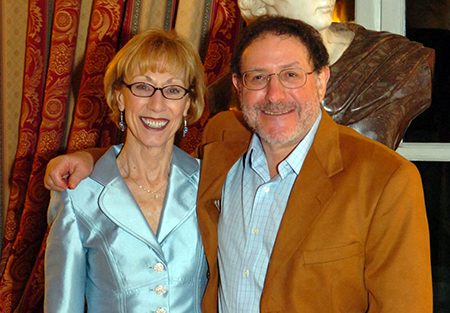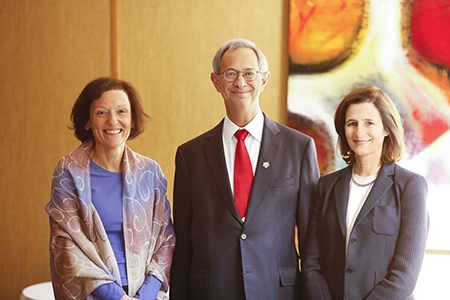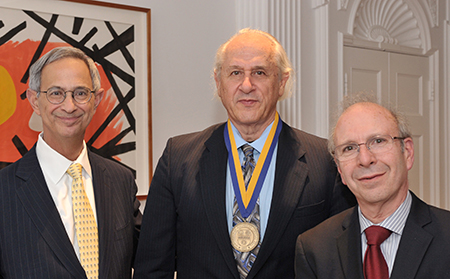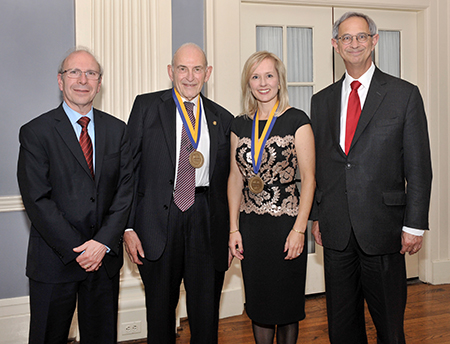A Name for Entrepreneurship

Carolyn Ain and Mark Ain '67S (MBA)
There are many ways to define “entrepreneurship.” The University of Rochester does it in broad terms: generating and transforming ideas into enterprises that create value.
Our definition’s breadth speaks directly to our entrepreneurial history, beginning with conventional exemplars George Eastman, founder of Eastman Kodak, and Joe Wilson ’31, founder of Xerox Corporation. But it also applies to industry innovators such as William H. Riker, political scientist and former University professor, who pioneered the use of game theory and mathematics in his field, and Loretta Ford ’00 (HNR), dean and professor emerita of the School of Nursing, who co-founded the nurse practitioner model.
When it comes to our entrepreneurial future, the names you need to know are Mark Ain ’67S (MBA) and his wife, Carolyn, the new namesakes of the University’s Ain Center for Entrepreneurship. The Center was named in honor of the Ains’ $5 million in collective philanthropy toward the University, including their recent multimillion-dollar commitment to support entrepreneurship education.
To learn more about the Ains’ latest gift, take a look at the official news release.
Committed to Idea Exploration

Barbara Burger '83, Joel Seligman, and Mary Ann Mavrinac
Rochester students are empowered to study what they love and build their own University experience, thanks to our “no subjects required” curriculum.
One of the products of this academic autonomy is a learning environment where passions constantly collide. Our students have expressed the desire for more of those intellectual collisions by way of increased opportunities to connect with others who are like-minded or who have interests complementary to their own. The iZone, a River Campus Libraries’ project in development, aims to meet that need by giving students a space and resources to fully explore their social, cultural, community, and economic ideas. Only, when the iZone is completed, it will be known as the Barbara J. Burger iZone at the River Campus Libraries.
The iZone’s future namesake, Barbara Burger ’83, has committed $1 million to the River Campus Libraries in support of the learning space’s creation and implementation.
To learn about Burger’s gift and the iZone, take a look at the official news release.
Excellence in Stem Cell Biology

Joel Seligman, Mark Noble, and Mark Taubman
Alexander Fleming’s discovery of penicillin launched an age of antibiotics that turned cuts and scratches, once potentially fatal afflictions, into minor injuries. And vaccines have made it possible to completely eradicate diseases which, in the case of smallpox, we did in 1979. Much like the development of antibiotics and vaccines, discoveries in stem cell biology have the potential to revolutionize our ability to treat and prevent disease.
More exciting than the prospect of stem cell research leading to a transformative discovery is the prospect of it happening at the Medical Center. Right now, Director of UR Medicine’s Stem Cell and Regenerative Medicine Institute Mark D. Noble, Ph.D., is leading those efforts.
Noble and a team of colleagues are addressing a wide range of areas related to stem cell biology and regenerative medicine. In 2014, he received a New York State Stem Cell grant to investigate lysosomal storage disorders, which cause devastating damage to the brain and spinal cord. There are currently no treatments for these diseases, but Noble and his colleagues aim to change that by looking for properties in existing drugs that prevent their toxic activities. Noble’s work in this area is just one example of why he was installed as the Martha M. Freeman, M.D. Professor in Biomedical Genetics on September 25.
The Freeman Professorship was created by late alumni Martha Mann Freeman ’44, ’45N, ’51M (MD) and Donald M. Foster ’50M (MD). Freeman was a passionate researcher and proud alumna, and her generous provisions for the University in her will helped establish the professorship. Foster, a radiologist and longtime supporter of the School of Medicine and Dentistry, made similar arrangements in his estate plan. His bequest helped fund two additional professorships—in biostatistics and biomedical genetics—named in his honor.
“We were able to honor one of our finest researchers, thanks to Martha and Donald’s pride as members of the University community,” said President and CEO Joel Seligman. “I am delighted that Mark Noble is the inaugural holder of this professorship. Mark is exceptionally worthy and poised to extend stem cell biology into transformative territory.”
In addition to the treatment of lysosomal dysfunction, Noble and his team are focused on developing novel cancer treatments that are more effective and less damaging to normal tissue than existing therapies and regeneration in acute and chronic injury to the central and peripheral nervous system.
“Stem cell biology could be the key to unlocking medicine that gives us a greater capacity to fight disease and reduce suffering,” said Mark B. Taubman, M.D., CEO of the URMC and UR Medicine and dean of the School of Medicine and Dentistry. “Mark’s work is making that key more and more tangible, and it’s making me more and more optimistic that we are not far from the next life-changing discovery.”
Championing Pediatric Allergy

Mark Taubman, Eric Dreyfuss, Kirsi Järvinen-Seppo, and Joel Seligman
If you traced the subspecialty of pediatric allergy back to its roots, you would end up at the Medical Center.
In 1931, Jerome Glaser, M.D., served as founding director of a clinic devoted to pediatric allergy at Strong Memorial Hospital. He also wrote the subspecialty’s first textbook and started one of the first training programs. One of his first trainees was also his successor: Douglas E. Johnstone, M.D.
Continuing Glaser’s work, Johnstone pioneered the efficacy of allergy injections. His successor, and former trainee, Robert H. Schwartz, directed the program until 1985. Schwartz was editor for the Journal of Pediatric Asthma, Allergy and Immunology.
A new University professorship honors the founders of pediatric allergy in Rochester. A pediatric allergist at the Medical Center for more than 50 years, Eric M. Dreyfuss, M.D., established the Founders’ Distinguished Professorship of Pediatric Allergy to ensure that children who suffer from allergies will be given the best possible care for generations to come. No one is better suited to be the first Founders’ Professor than pediatric allergy champion Kirsi M. Järvinen-Seppo, M.D., Ph.D. Järvinen-Seppo and Dreyfuss were both recognized by the University community on September 30.
“I am delighted that Eric’s passion for maintaining UR Medicine’s excellence in pediatric allergy has resulted in the creation of a distinguished professorship,” said President and CEO Joel Seligman. “It honors our past and empowers our future, beginning with its first holder, Kirsi Järvinen-Seppo, who I am confident will further enrich Rochester’s reputation in the field.”
Director of the Center for Food Allergy, Järvinen-Seppo has clinical interests in various types of food allergy and other allergic disorders. Her translational research program, which is focused on prevention of food allergy, including breast milk immunologic factors, is funded by the National Institutes of Health.
“The creation of the Founders’ Professorship has done three incredible things all at once,” said Mark B. Taubman, M.D., CEO of the URMC and UR Medicine and dean of the School of Medicine and Dentistry. “It has preserved the legacy of an outstanding program; it has allowed us to recognize an outstanding faculty member in Kirsi, who is building on top of the standards her predecessors created; and it has given us an even greater ability to care for the region’s children.”